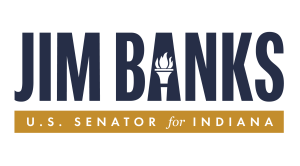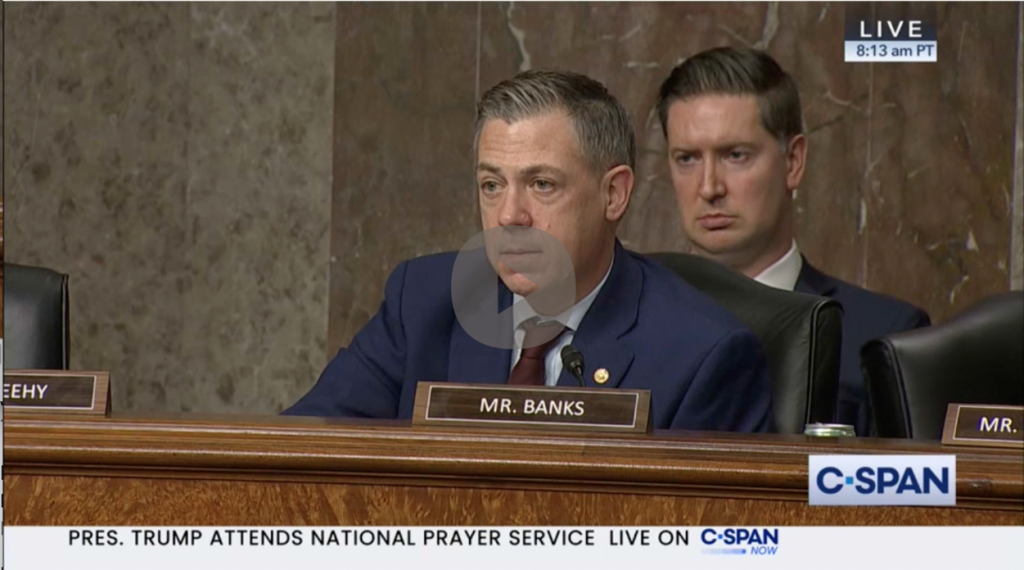WASHINGTON, D.C. – This morning, Senator Jim Banks (R-Ind.) questioned Doug Collins, President Trump’s nominee for Secretary of Veteran’s Affairs, during his confirmation hearing before the Senate Veterans’ Affairs Committee:
Click the image above for the full questioning
Full Transcript:
Senator Jim Banks: “Mr. Collins, great to see you. We served together in the House, and those four years of President Trump’s first term were four great years for America’s veterans. President Trump was the ‘veteran’s president’. We did great things from expanding ‘the MISSION Act’ to greater accountability for VA employees. We loosened standards for the GI Bill. President Trump sent us down a path to modernize electronic health records. The list goes on and on from the VA crisis hotline to other issues that were priorities for him that you and I had a chance to work on in the House is among the greatest accomplishments since in the eight years that I’ve served in Congress. Now we have another four years and you’re going to be a great secretary working with a great president. I can’t wait to work with you to do even greater things for America’s heroes.
“I do have some concerns about the condition of our medical facilities. And you and I talked about this in my office. The Indianapolis Medical Center is due for a total replacement. It’s in the VA’s five-year development plan. Meaning it’s a project that you have on the books, but you don’t have funding to do it. Will you commit today to working with me to get that project started next year as the VA plans call for?”
Doug Collins: Thank you, Senator. And as working with this body to get the funding needs for all of our construction and priority needs are going to be there. One of the issues that we have and if you allow me to spin off of that, because you have experience of it, is our average age of many of our facilities, especially our hospitals that is 60 plus years old. This is beyond when you look at the private hospitals or in the public hospitals are averaged 15 to 20 years, it’s just a whole difference, which throws into so many different problems. So construction is going to be something and the projects like that are going to be important, but also as we just discussed and Senator King brought up, the electronic healthcare record system, some of our existing facilities that we’re not really going to renew are going to have to have major work just to hold the computer systems and others to make that happen. So, it’s something we’re going to work toward to make sure that we get it funded. We look forward to working with this body to get the money for that and with support working through that.
***
Sen. Banks: “Thank you for that. I look forward to working with you on that. The VA, as you know, has struggled with construction, maintenance, and leasing for years and Indianapolis and a lot of other projects around the country are facing significant delays which is harming our veterans. How are you going to prioritize reforming the offices to handle these functions within the VA?”
Collins: “Senator I think what we’ve looking at here and really where you got to go is making sure that we have a what I’m hoping to find is a more, I won’t say slimmed down but, a very focused vision on our acquisitions, our construction projects, so that we’re not going through multiple layers that, as you well know, add time if this person has to sign off, but making it applicable. This body has already said that if projects over 100 million have to go with the Corps of Engineers. We have those other issues now after the project in Aurora and in Colorado, which went so far, which we were here for. That’s why we’ve got to make sure that we have the right people in those positions and bring in help when we need to say, ‘OK, how can this project be built more cost-effectively?’ And if I could say one thing, one of the reasons, yes, I looked at this job and looked and asked myself if I even wanted to do it, was those four years that you just mentioned. Because I knew a president in Donald Trump who actually wanted to take care of veteran’s and didn’t just say it but actually showed it and what we did and we worked on here in the Hill.”
***
Sen. Banks: “I would add to that the last four years have been very different. [It] hasn’t been a priority of the administration that you’re following and I’m looking forward to changing that very quickly. When I served on the House of Veterans Affairs Committee, there was a lot of confusion about where the VA was going to put new clinics and why those counties or towns or cities were chosen. And it made it really hard for me as a congressman to explain to my constituents why this town was chosen for this clinic and another location wasn’t. Do you think the VA should let Congress know in advance where planned clinics are going not just send us a letter when a lease gets awarded?”
Collins: “I believe that we should have a much better working relationship with Congress in regards to all aspects of this and I think that includes you know CBOCs [community based outpatient clinics] and we just discussed earlier conversation I’ve had with Senator Duckworth about how we locate those maybe even with others. But if you would allow me just a moment there’s one area that I want to this whole body to hear and it’s the one of the main emphasis that I’m going to have I believe and after listening to over, like I said, 60 plus conversations and more, that we have to have a better working relationship with the VA and the members of this committee in the body through our legislative affairs. Legislative affairs under my leadership, if confirmed by this body, is going to be proactive, not reactive. They’ll still be there for this committee and the House committee to answer policy questions and to do those things, but I want to have actually legislative affairs people boots on the ground, so to speak, here on the Hill, talking not just to you about your concern, but hearing from your constituent services workers. 60% of most all of your constituent services will fall under VA, whether it’s benefits or healthcare. I want our folks to know that up front so that your people can know who to talk to, but then they will relay the reports to me. So that if in Indiana we have a problem that is coming from your office and a couple of the congressmen’s office, we’re going to have a chance to react to that much quicker. And so that I’ll have the information. So that we’re not seeing something in the paper six months later or having to you to call. I’ve made the promise to everyone here that I do not come in this with rose-colored glasses. I think this is a large undertaking that I feel called to be at. But I will say this, for all of you who have it and I’ve heard it as well in my eight years as Congress, when a member of the military, a veteran, has to call our office, a congressman or a senator’s office, to get the care they’ve already earned. It is a mark of failure in our department. It’s not something we can’t overcome and there’s plenty of things to do it. But I believe until we get to that mark, the VA does itself, then we’re not taking care of veterans as fully as we can. And I’m going to encourage all of our employees to get to that standard.
BACKGROUND:
The existing Indianapolis VA medical center was built in 1952 and has roughly $100 million of facility condition deficiencies.
To get the Indianapolis medical center project started with architectural planning and design in 2026, the Trump administration will need to include the project in its fiscal year 2026 budget request, and Congress will need to authorize it and appropriate at least $206 million. The authorization will move through the Senate Veterans’ Affairs Committee.

